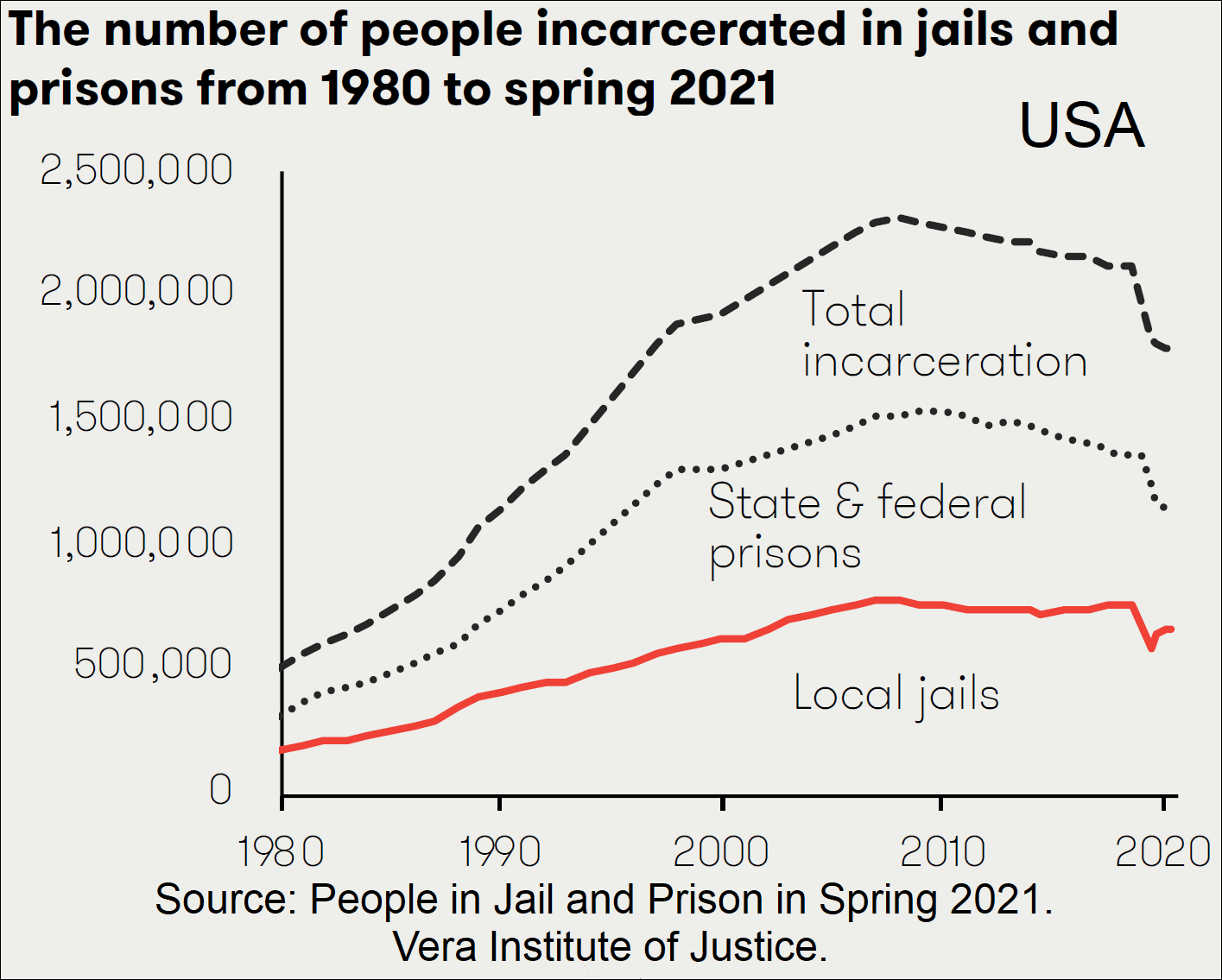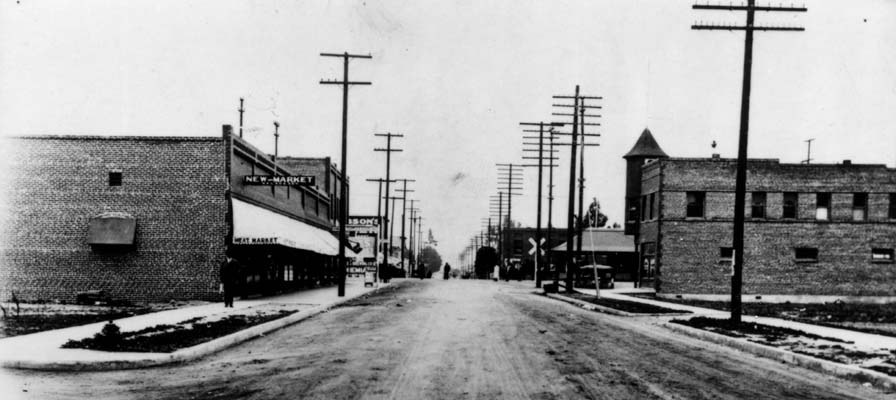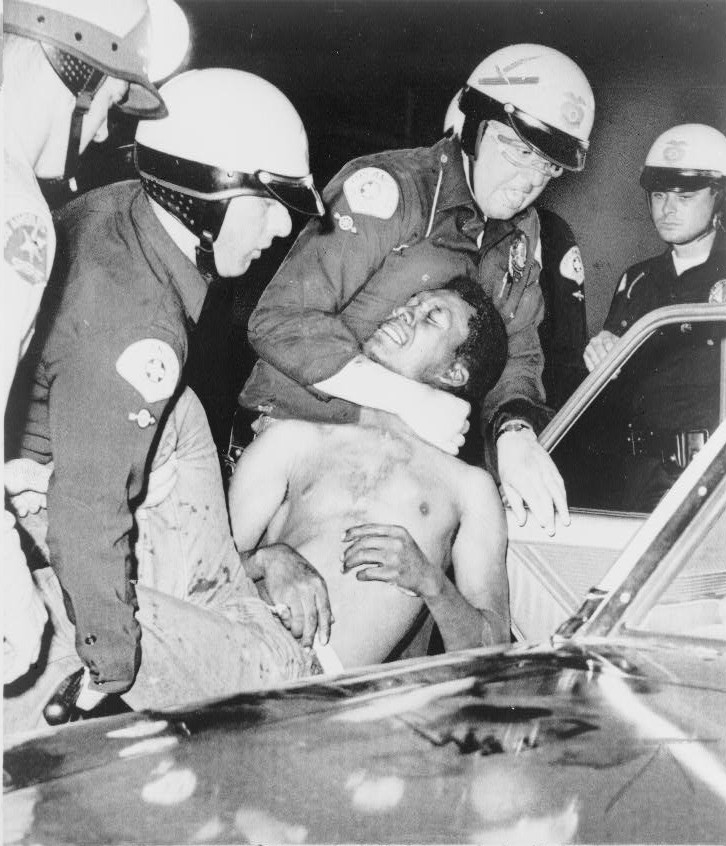|
Tough-on-crime
In modern politics, "law and order" is an ideological approach focusing on harsher enforcement and penalties as ways to reduce crime. Penalties for perpetrators of disorder may include longer terms of imprisonment, mandatory sentencing, three-strikes laws and even capital punishment in some countries. Supporters of "law and order" argue that harsh punishment is the most effective means of crime prevention. Opponents argue that a system of harsh criminal punishment is ultimately ineffective because it self-perpetuates crime and does not address underlying or systemic causes of crime. They furthermore credit it with facilitating greater militarisation of police and contributing to mass incarceration in the United States. Despite the widespread popularity of "law and order" ideas and approaches between the 1960s to the 1980s exemplified by presidential candidates including Richard Nixon and Ronald Reagan running successfully on a "tough-on-crime" platform, statistics on crime s ... [...More Info...] [...Related Items...] OR: [Wikipedia] [Google] [Baidu] |
Incarceration In The United States
Incarceration in the United States is one of the primary means of punishment for crime in the United States. In 2021, over five million people were under supervision by the criminal justice system, with nearly two million people incarcerated in state or federal prisons and local jails. The United States has the largest known prison population in the world. It has 5% of the world’s population while having 20% of the world’s incarcerated persons. China, with more than four times more inhabitants, has fewer persons in prison.Highest to Lowest World Prison Brief (WPB). Use the dropdown menu to choose lists of countries by region or the whole world. Use the menu to select highest-to-lowest lists of prison population totals ... [...More Info...] [...Related Items...] OR: [Wikipedia] [Google] [Baidu] |
Mandatory Sentencing
Mandatory sentencing requires that people convicted of certain crimes serve a predefined term of imprisonment, removing the discretion of judges to take issues such as extenuating circumstances and a person's likelihood of rehabilitation into consideration when sentencing. Research shows the discretion of sentencing is effectively shifted to prosecutors, as they decide what charges to bring against a defendant. Mandatory sentencing laws vary across nations; they are more prevalent in common law jurisdictions because civil law jurisdictions usually prescribe minimum and maximum sentences for every type of crime in explicit laws. They can be applied to crimes ranging from minor offences to extremely violent crimes including murder. Mandatory sentences are considered a "tough on crime" approach that intend to serve as a general deterrence for potential criminals and repeat offenders, who are expected to avoid crime because they can be certain of their sentence if they are caught. ... [...More Info...] [...Related Items...] OR: [Wikipedia] [Google] [Baidu] |
Samuel Ward King
Samuel Ward King (May 23, 1786 – January 20, 1851) was the 15th Governor of Rhode Island from 1839 to 1843. He was born in Johnston, Rhode Island to William Borden King and Welthian Walton King. King attended Brown University but did not graduate. He became a medical doctor and worked as a surgeon during the War of 1812. In 1820, King was elected town clerk of Johnston. He became a Whig when the party was founded, and was a presidential elector in 1832. In 1838, he was elected to the Rhode Island Senate. He first became governor in 1839 when the legislature failed to grant a majority of votes to the three leading contenders. He was elected to three other terms. During his administration as governor, he took a strong stand against the expanded voting franchise that led to the Dorr Rebellion in 1841 – 1842. President John Tyler John Tyler (March 29, 1790 – January 18, 1862) was the tenth president of the United States, serving from 1841 to 1845, after briefly ho ... [...More Info...] [...Related Items...] OR: [Wikipedia] [Google] [Baidu] |
Watts, Los Angeles
Watts is a neighborhood in southern Los Angeles, California. It is located within the South Los Angeles region, bordering the cities of Lynwood, Huntington Park and South Gate to the east and southeast, respectively, and the unincorporated community of Willowbrook to the south. Founded in the late nineteenth century as a ranching community, the arrival of the railroads and the construction of Watts Station saw the rapid development of Watts as an independent city, but in 1926 it was consolidated with Los Angeles. By the 1940s, Watts transformed into a primarily working class African-American neighborhood, but from the 1960s developed a reputation as a low-income, high-crime area, following the Watts riots and the increasing influence of street gangs. Watts has become a predominantly Hispanic neighborhood with a significant African American minority, and remains one of the most impoverished neighborhoods in Los Angeles despite falling crime rates since the 1990s. Notable ... [...More Info...] [...Related Items...] OR: [Wikipedia] [Google] [Baidu] |
Watts Riots
The Watts riots, sometimes referred to as the Watts Rebellion or Watts Uprising, took place in the Watts neighborhood and its surrounding areas of Los Angeles from August 11 to 16, 1965. The riots were motivated by anger at the racist and abusive practices of the Los Angeles Police Department, as well as grievances over employment discrimination, residential segregation, and poverty in L.A. On August 11, 1965, Marquette Frye, a 21-year-old black man, was pulled over for drunk driving.Dawsey, Darrell (August 19, 1990)"To CHP Officer Who Sparked Riots, It Was Just Another Arrest" ''Los Angeles Times''. After he failed a field sobriety test, officers attempted to arrest him. Marquette resisted arrest, with assistance from his mother, Rena Frye; a physical confrontation ensued in which Marquette was struck in the face with a baton. Meanwhile, a crowd of onlookers had gathered. Rumors spread that the police had kicked a pregnant woman who was present at the scene. Six days of civ ... [...More Info...] [...Related Items...] OR: [Wikipedia] [Google] [Baidu] |
Barry Goldwater
Barry Morris Goldwater (January 2, 1909 – May 29, 1998) was an American politician and major general in the United States Air Force, Air Force Reserve who served as a United States senator from 1953 to 1965 and 1969 to 1987, and was the Republican Party (United States), Republican Party's nominee for president 1964 United States presidential election, in 1964. Goldwater was born in Phoenix, Arizona, where he helped manage his family's department store. During World War II, he flew aircraft between the U.S. and India. After the war, Goldwater served in the Phoenix City Council. In 1952, he was elected to the U.S. Senate, where he rejected the legacy of the New Deal and, along with the conservative coalition, fought against the New Deal coalition. Goldwater also challenged his party's Rockefeller Republican, moderate to liberal wing on policy issues. He supported the Civil Rights Act of 1957, Civil Rights Acts of 1957 and Civil Rights Act of 1960, 1960 and the Twenty-fourth A ... [...More Info...] [...Related Items...] OR: [Wikipedia] [Google] [Baidu] |
William Goebel
William Justus Goebel (January 4, 1856 – February 3, 1900) was an American Democratic politician who served as the 34th governor of Kentucky for four days, having been sworn in on his deathbed a day after being shot by an assassin. Goebel is the only sitting state governor in United States history to die by assassination. Goebel was born to Wilhelm and Augusta Goebel (), German immigrants from Hanover. He studied at the Hollingsworth Business College in the mid-1870s and became an apprentice at John W. Stevenson's law firm. While Goebel lacked the social qualities like public speaking that are common with politicians, various authors referred to him as an intellectual man. He served in the Kentucky Senate, campaigning for populist causes like railroad regulation, which won him many allies and supporters. In 1895, Goebel engaged in a duel with John Lawrence Sandford, a former Confederate general staff officer turned cashier. According to the witnesses, both men then dre ... [...More Info...] [...Related Items...] OR: [Wikipedia] [Google] [Baidu] |
White Ethnic
White ethnic is a term used to refer to white Americans who are not Old Stock or White Anglo-Saxon Protestant. "Religion is the most critical factor in separating white ethnics in American society. As Catholics and secondarily Jews ... they were immediately set apart from the Protestant majority at the time of their entrance and given a strongly negative reception." They consist of a number of distinct groups and make up approximately 69.4% of the white population in the United States. The term usually refers to the descendants of immigrants from Southern, Central and Eastern Europe, Ireland, the Caucasus and France/ Francophone Canada. History In the 19th century, American industrial development caused millions of immigrants to emigrate from Europe to the United States. Many came to provide labor for the industrial growth of the Northeast and Midwest, and multitudes of immigrants from non British or non-Germanic Protestant backgrounds settled in the nation's growing citie ... [...More Info...] [...Related Items...] OR: [Wikipedia] [Google] [Baidu] |
Richard Nixon
Richard Milhous Nixon (January 9, 1913April 22, 1994) was the 37th president of the United States, serving from 1969 until Resignation of Richard Nixon, his resignation in 1974. A member of the Republican Party (United States), Republican Party, he previously served as the 36th Vice President of the United States, vice president under President Dwight D. Eisenhower from 1953 to 1961, and also as a United States House of Representatives, representative and United States Senate, senator from California. Presidency of Richard Nixon, His presidency saw the reduction of U.S. involvement in the Vietnam War, ''détente'' with the Soviet Union and China, the Apollo 11 Moon landing, and the establishment of the United States Environmental Protection Agency, Environmental Protection Agency and Occupational Safety and Health Administration. Nixon's second term ended early when he became the only U.S. president to resign from office, as a result of the Watergate scandal. Nixon was born ... [...More Info...] [...Related Items...] OR: [Wikipedia] [Google] [Baidu] |
Ronald Reagan
Ronald Wilson Reagan (February 6, 1911 – June 5, 2004) was an American politician and actor who served as the 40th president of the United States from 1981 to 1989. He was a member of the Republican Party (United States), Republican Party and became an important figure in the American conservative movement. Presidency of Ronald Reagan, His presidency is known as the Reagan era. Born in Illinois, Reagan graduated from Eureka College in 1932 and was hired the next year as a sports broadcaster in Iowa. In 1937, he moved to California where he became a well-known film actor. During his acting career, Reagan was president of the Screen Actors Guild twice from 1947 to 1952 and from 1959 to 1960. In the 1950s, he hosted ''General Electric Theater'' and worked as a motivational speaker for General Electric. During the 1964 United States presidential election, 1964 presidential election, Reagan's "A Time for Choosing" speech launched his rise as a leading conservative figure. After b ... [...More Info...] [...Related Items...] OR: [Wikipedia] [Google] [Baidu] |
George Wallace 1968 Presidential Campaign
Former Governor of Alabama George Wallace ran in the 1968 United States presidential election as the candidate for the American Independent Party against Richard Nixon and Hubert Humphrey. Wallace's pro-segregation policies during his term as Governor of Alabama were rejected by most. The impact of the Wallace campaign was substantial, winning the electoral votes of several states in the Deep South. Although Wallace did not expect to win the election, his strategy was to prevent either major party candidate from winning a majority in the Electoral College. This would throw the election into the House of Representatives, where Wallace would have bargaining power sufficient to determine, or at least strongly influence, the selection of a winner. Although Nixon ultimately won a majority of 301 electoral votes (270 being a majority), Wallace's effort put the chance of a brokered electoral college relatively close. For example, had Wallace won South Carolina or Tennessee (falling les ... [...More Info...] [...Related Items...] OR: [Wikipedia] [Google] [Baidu] |
Dog Whistle (politics)
In politics, a dog whistle is the use of coded or suggestive language in political messaging to garner support from a particular group without provoking opposition. The concept is named after ultrasonic dog whistles, which are audible to dogs but not humans. Dog whistles use language that appears normal to the majority but communicates specific things to intended audiences. They are generally used to convey messages on issues likely to provoke controversy without attracting negative attention. Origin and meaning According to William Safire, the term ''dog whistle'' in reference to politics may have been derived from its use in the field of opinion polling. Safire quotes Richard Morin, director of polling for ''The Washington Post'', as writing in 1988: subtle changes in question-wording sometimes produce remarkably different results ... researchers call this the "Dog Whistle Effect": Respondents hear something in the question that researchers do not. He speculates that c ... [...More Info...] [...Related Items...] OR: [Wikipedia] [Google] [Baidu] |






